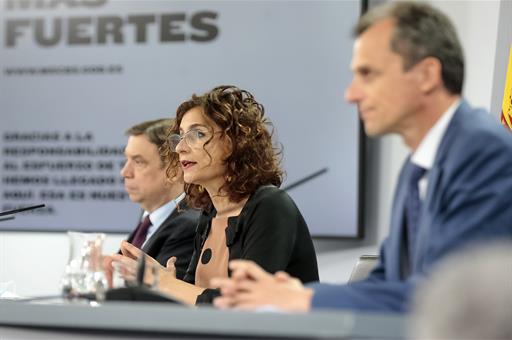Council of Ministers
Government to strengthen agri-food sector with new reform of Food Chain Act
Council of Ministers - 2020.6.30
Moncloa Palace, Madrid
The Council of Ministers analysed the draft bill to amend the current Food Chain Act 12/2013, which transposes European Directive 2019/633 on unfair trade practices.
The Minister for Agriculture, Fisheries and Food, Luis Planas, stated that this reform, together with Royal Decree-Law 5/2020 on urgent measures on agriculture and food, approved in February, will allow a structural reform to be undertaken of the primary sector and agriculture, enhancing legal certainty, business planning and the ability to become more competitive. "This is the best recognition by this government of the excellent conduct of the agri-food sector during the COVID-19 crisis", he underlined.
Some of the aspects designed to be corrected are the price formation system and the scant negotiating capacity of crop and livestock farmers compared with the other links in the chain, already beset by such factors as climate, the fragmentation of supply, market price volatility and the customs dues imposed by the United States.
Luis Planas recalled that in February, in order to cater for a "just claim from the sector" to receive fair prices for their work and their products, the Food Chain Act was partially amended, introducing written contracts as obligatory - which must always be signed in reference to production costs that are lower than the sale price - and banning practices that amount to a loss of value throughout the chain, and trade practices that undervalued the work of crop and livestock farmers.
Keys of new legislation
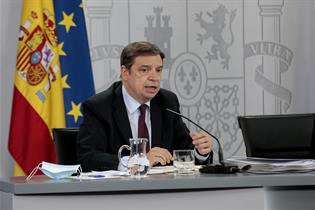 Pool Moncloa/J.M.CuadradoThe new legislation seeks to extend written contracts to all transactions in excess of 2,500 euros and extend the list of banned unfair trade practices to adapt it to EU law.
Pool Moncloa/J.M.CuadradoThe new legislation seeks to extend written contracts to all transactions in excess of 2,500 euros and extend the list of banned unfair trade practices to adapt it to EU law.
"A blacklist exists, with practices that are banned under all circumstances, and a greylist that includes those that may be tolerated", he explained.
Protection against unfair practices will always be applied when a Spanish operator is involved. The list of products covered is extended to also include processed products.
The Food Information and Control Agency (Spanish acronym: AICA), attached to the Ministry of Agriculture, Fisheries and Food, will be tasked with establishing and developing the necessary control system and penalising infringements. This agency will also coordinate the competent inspection and disciplinary institutions of the regional authorities.
The minister announced that the draft bill may be finally approved by the government in the autumn for its submission to and passage through the Lower House of Parliament. Prior to that, it will be subject to a mandatory report from the regional governments, the National Markets and Competition Commission, the Social and Economic Council and the Council of State. The draft bill was subject to a public information process in April and received 87 contributions from interested parties in the sector, while also subject to debate by the Food Chain Watchdog.
Support for agriculture and fisheries sector
The Council of Ministers agreed to distribute almost 13.5 million euros to regional governments, in line with the agreement reached at the Agriculture and Rural Development, and Fisheries Sector Conferences, held on 15 June.
Luis Planas explained that 10 million euros will be allocated to support for lamb and goat agricultural holdings that are having difficulties with sales as a result of the limitations imposed due to COVID-19. A further 3,387,772 euros will be allocated to financing the temporary shutdowns of the fishing fleets in the Mediterranean and the Gulf of Cadiz.
The government also approved an amendment to the Royal Decree to apply the measures under the Programme to Support the Spanish Wine Sector 2019-2023 (Spanish acronym: PASVE), to adapt it to new European legislation.
Better working conditions in fisheries sector
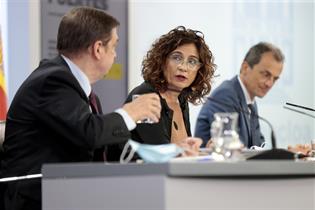 Pool Moncloa/J.M. CuadradoThe government approved a Royal Decree establishing improvements to working conditions in the fishing sector and to raise the level of protection for fishermen working on Spanish fishing vessels.
Pool Moncloa/J.M. CuadradoThe government approved a Royal Decree establishing improvements to working conditions in the fishing sector and to raise the level of protection for fishermen working on Spanish fishing vessels.
The Minister for the Treasury ad Government Spokesperson, María Jesús Montero, highlighted that the new legislation makes is obligatory to formalise a written employment agreement, to supply accurate information to the worker on labour conditions, minimum conditions for crew accommodation, the right to medical attention and the right to repatriation to the country of residence in the event that the labour relationship is suspended or terminated when the vessel is in a foreign port.
The Government Spokesperson stated that these measures transpose European law and allow legislation to be harmonised with other EU countries to create "fair competitive conditions and strengthen the internal market". María Jesús Montero remarked that another aim is to convey to non-EU countries with large fishing fleets that competition cannot prosper as a result of insufficient protection for sector workers.
Research strategy to tackle COVID-19
The Minister for Science and Innovation, Pedro Duque, presented a report on the research strategy to overcome COVID-19 and drive innovation in Spain.
The document shows that the government's activity has focused on three main cornerstones: support and monitoring of research projects, promoting business innovation of COVID-19 and the generation of better data and their analysis to take the best decisions in the return to normality.
Pedro Duque highlighted the launch of the COVID-19 Fund, with an allocation of 24 million euros managed by the Carlos III Health Institute, and the mobilisation of the own resources of the Higher Scientific Research Council and other ministerial bodies.
The Fund has helped finance 127 projects and a large number of clinical trials to test the efficacy of treatments approved in the fight against the virus. The minister specified that Spain is currently developing almost 100 clinical trials. He also underlined that new techniques to diagnose and detect SARS-CoV-2 have been developed that are quicker and safer, and which contribute to the early detection of the disease. These include molecular biology techniques with different methodologies to the PCR tests and optical and multispectral procedures to detect the virus in the air, in waste and on surfaces.
Vaccines
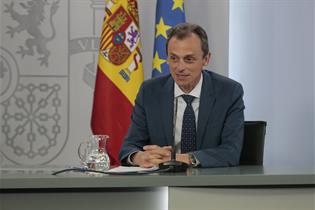 Pool Moncloa/J.M.CuadradoThe minister stated that almost 180 vaccine projects are being conducted around the world and 12 vaccine developments are being publicly financed in Spain. Five of these research groups already have a vaccine prototype or candidate and trials have begun on animals to assess their immunogenic capacity and potential toxicity. The rest expect to complete their vaccine prototypes in the coming weeks and start testing on animals between July and September. It is estimated that four of these projects will be ready to begin the clinical phase on humans in December 2020.
Pool Moncloa/J.M.CuadradoThe minister stated that almost 180 vaccine projects are being conducted around the world and 12 vaccine developments are being publicly financed in Spain. Five of these research groups already have a vaccine prototype or candidate and trials have begun on animals to assess their immunogenic capacity and potential toxicity. The rest expect to complete their vaccine prototypes in the coming weeks and start testing on animals between July and September. It is estimated that four of these projects will be ready to begin the clinical phase on humans in December 2020.
In parallel, the adaptation of corporate facilities that produce veterinary use vaccines are being funded to produce vaccines for use on humans.
As regards access to vaccines, Pedro Duque explained that a commitment exists in the European Union for their global purchase with European funds and, if additional financing is required, to resort to Member States. This agreement means that the distribution of vaccine lots will be undertaken in a fair manner, proportional to the size of the population, the needs of countries and certain defined criteria.
An Executive Committee made up of seven countries, including Spain, is heading up the selection of vaccines and negotiations for their purchase. "While cautious, we are optimistic that a vaccine will be discovered, that we will be able to differentiate which vaccine works best and make is available to the Spanish health system as soon as it is proven to be sufficiently safe and effective", underlined Pedro Duque.
Boost to science and innovation
The minister argued that science and innovation are profitable and competitive and considers it crucial for the reconstruction of the country following the coronavirus to involve a change in the productive process based on these fields.
To this end, Pedro Duque announced that the government intends to present a plan with reforms and resources for the scientific system to be far more efficient. The main cornerstones of this plan are to strengthen biomedical research, to attract talent and to drive business research.
"Society, the public authorities and parliamentary groups agree that we must strengthen the scientific system and that now is the time to invest in science", he concluded.
Programme to Extend New Generation Broadband
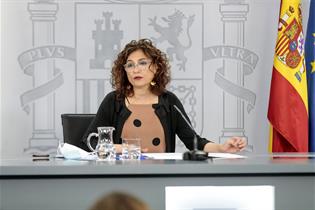 Pool Moncloa/J.M.CuadradoThe Council of Ministers has authorised the call for proposals for support for the Programme to Extend New Generation Broadband 2020-2022, for a maximum sum of 150 million euros, of which 125 million will come from European funding.
Pool Moncloa/J.M.CuadradoThe Council of Ministers has authorised the call for proposals for support for the Programme to Extend New Generation Broadband 2020-2022, for a maximum sum of 150 million euros, of which 125 million will come from European funding.
María Jesús Montero explained that this will be in the form of support for private telecommunications operators so that they can increase the coverage of new generation broadband to areas that currently have no coverage or have low-speed connections.
The Government Spokesperson highlighted that the government, including this sixth call for proposals, has granted 479 million euros in support and set in motion projects for the sum of 871 million euros. "We have provided high-speed Internet access to 5.48 million homes and companies in residential areas that previously lacked this, a ratio that allows us to have indicators above the European Union average, particularly in terms of coverage in rural areas".
Against this backdrop, María Jesús Montero recalled that one of the government's priorities is the demographic challenge and the connectivity and accessibility to public services regardless of where people may live.
Other agreements
The government has updated the National List of Professional Qualifications with the creation of the qualifications of Home Delivery and Collection Service (Level 1) and the updated qualifications of Internet Service Administration (Level 3) and Aesthetic Hygiene, Waxing and Makeup Services (Level 2).
The government has also regulated the bestowal of the award of Honorary National Police Officer in recognition of their work.
Current affairs
The Government Spokesperson announced that, in accordance with European Union recommendations, visitors will be allowed to enter the country from the following third countries: Thailand, Algeria, Australia, Canada, South Korea, Japan, Georgia, Montenegro, New Zealand, Rwanda, Serbia, Tunisia, Uruguay, Morocco and China. The latter two countries have been asked for reciprocity agreements; in other words, borders will be opened when they also allow Spanish citizens into their territory.
The criteria to establish this list have been "epidemiological and not diplomatic", continued the minister and include the level of cases being no higher than the European average of 16 cases per 100,000 inhabitants, and that the curve of contagions is on a downward trend. The data will be reviewed every 15 day to extend or reduce the list of countries with no access restrictions.
Control and safety at airports
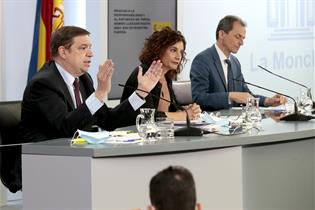 Pool Moncloa/J.M.CuadradoSpanish airports have now implemented the control and safety measures agreed by the European Union, in collaboration with airlines and health and disease prevention authorities.
Pool Moncloa/J.M.CuadradoSpanish airports have now implemented the control and safety measures agreed by the European Union, in collaboration with airlines and health and disease prevention authorities.
The measures include documentary and temperature controls, but not such diagnostic tests as PCR which, said the minister, are not recommended on a general basis because they only offer a snapshot at a specific time. "What is truly important is that monitoring is performed as early as possible to be able to halt the spread of the disease", argued María Jesús Montero, who regretted those who raised doubts over the usefulness and viability of the measures established. "Scaremongering is irresponsible on this matter", she concluded.
Trip by President of the Government to Mauritania
María Jesús Montero reported on the first international trip by the President of the Government, Pedro Sánchez, since the start of the COVID-19 pandemic. Pedro Sánchez travelled on Tuesday afternoon to Mauritania to take part in the Sahel Summit, hold a meeting with the country's president, Mohamed Ould Cheikh Ghazouani, and hand over health material to combat the coronavirus.
The Government Spokesperson stated that the pandemic continues to spread around the globe and hence we must not lower our guard. The regional governments are acting swiftly to isolate those cases detected, "which shows that the preventive system is working smoothly", but warned that it is necessary to still maintain a responsible individual attitude and comply with the health recommendations.
15 years of same sex marriage
The Government Spokesperson recalled the anniversary of the legalisation of same sex marriage in Spain. "15 years ago, our country took a huge step forward by becoming one of the first countries to approve same sex marriage".
María Jesús Montero welcomed the fact that "both in the past and now we are advancing as a society to become more respectful, more tolerant and freer", and claimed that "those who oppose the attainment of these new rights head-on end up as years go by realising that Spanish society moves quicker than its prejudices".
Non official translation





